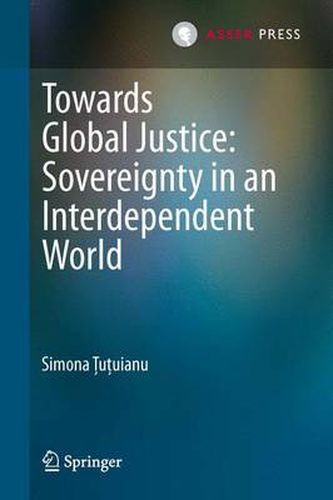Readings Newsletter
Become a Readings Member to make your shopping experience even easier.
Sign in or sign up for free!
You’re not far away from qualifying for FREE standard shipping within Australia
You’ve qualified for FREE standard shipping within Australia
The cart is loading…






This title is printed to order. This book may have been self-published. If so, we cannot guarantee the quality of the content. In the main most books will have gone through the editing process however some may not. We therefore suggest that you be aware of this before ordering this book. If in doubt check either the author or publisher’s details as we are unable to accept any returns unless they are faulty. Please contact us if you have any questions.
With Forewords by Geoffrey Robertson QC, Doughty Street Chambers, London, UK and Professor Mihail E. Ionescu, Bucharest, Romania
Simona Tutuianu describes a new model of sovereignty which is fast replacing the traditional Westphalian model embodied in Article 2 of the UN Charter and rigorously followed throughout the Cold War. The scholarly basis for this new model draws upon developments in international criminal law which first emerged from the Nuremberg trials and upon more recent interstate economic cooperation which has turned sovereign independence into interdependence across a range of state functions. Does this mean that traditional Westphalian concepts of sovereignty should be abandoned in constructing a new theory of world governance for the twenty-first century? Not at all. A new model, which can be called the pattern of interdependence-based sovereignty, serves to explain contemporary events that puzzle traditional theorists, such as the war over Kosovo, the invasions of Iraq and Libya, the emergence of a Responsibility to protect doctrine and its recent validation in Security Council Resolutions 1970 and 1973. We are witnessing the emergence of a new philosophy of action, which is in the process of producing a 21st century system of international relations.
The Book will appeal to academics, students and postgraduates studying international affairs, politics, international law, diplomatic history, or war and/or peace studies. It is particularly of interest for NATO establishments and national military schools, while experts and scholars will value its theory of what sovereignty means today.
The Book offers a multidisciplinary approach which underpins a new theory of how human rights can be better protected in a better world. There is a unique case study of cooperative security in the Greater Black Sea Area, by one of the few experts on the politics of this region. It will be read and appreciated by those who need to understand how modern international law and diplomacy really work. Journalists, media commentators, human rights NGOs, aid agencies, diplomats and government officials need the information in this Book.
$9.00 standard shipping within Australia
FREE standard shipping within Australia for orders over $100.00
Express & International shipping calculated at checkout
This title is printed to order. This book may have been self-published. If so, we cannot guarantee the quality of the content. In the main most books will have gone through the editing process however some may not. We therefore suggest that you be aware of this before ordering this book. If in doubt check either the author or publisher’s details as we are unable to accept any returns unless they are faulty. Please contact us if you have any questions.
With Forewords by Geoffrey Robertson QC, Doughty Street Chambers, London, UK and Professor Mihail E. Ionescu, Bucharest, Romania
Simona Tutuianu describes a new model of sovereignty which is fast replacing the traditional Westphalian model embodied in Article 2 of the UN Charter and rigorously followed throughout the Cold War. The scholarly basis for this new model draws upon developments in international criminal law which first emerged from the Nuremberg trials and upon more recent interstate economic cooperation which has turned sovereign independence into interdependence across a range of state functions. Does this mean that traditional Westphalian concepts of sovereignty should be abandoned in constructing a new theory of world governance for the twenty-first century? Not at all. A new model, which can be called the pattern of interdependence-based sovereignty, serves to explain contemporary events that puzzle traditional theorists, such as the war over Kosovo, the invasions of Iraq and Libya, the emergence of a Responsibility to protect doctrine and its recent validation in Security Council Resolutions 1970 and 1973. We are witnessing the emergence of a new philosophy of action, which is in the process of producing a 21st century system of international relations.
The Book will appeal to academics, students and postgraduates studying international affairs, politics, international law, diplomatic history, or war and/or peace studies. It is particularly of interest for NATO establishments and national military schools, while experts and scholars will value its theory of what sovereignty means today.
The Book offers a multidisciplinary approach which underpins a new theory of how human rights can be better protected in a better world. There is a unique case study of cooperative security in the Greater Black Sea Area, by one of the few experts on the politics of this region. It will be read and appreciated by those who need to understand how modern international law and diplomacy really work. Journalists, media commentators, human rights NGOs, aid agencies, diplomats and government officials need the information in this Book.